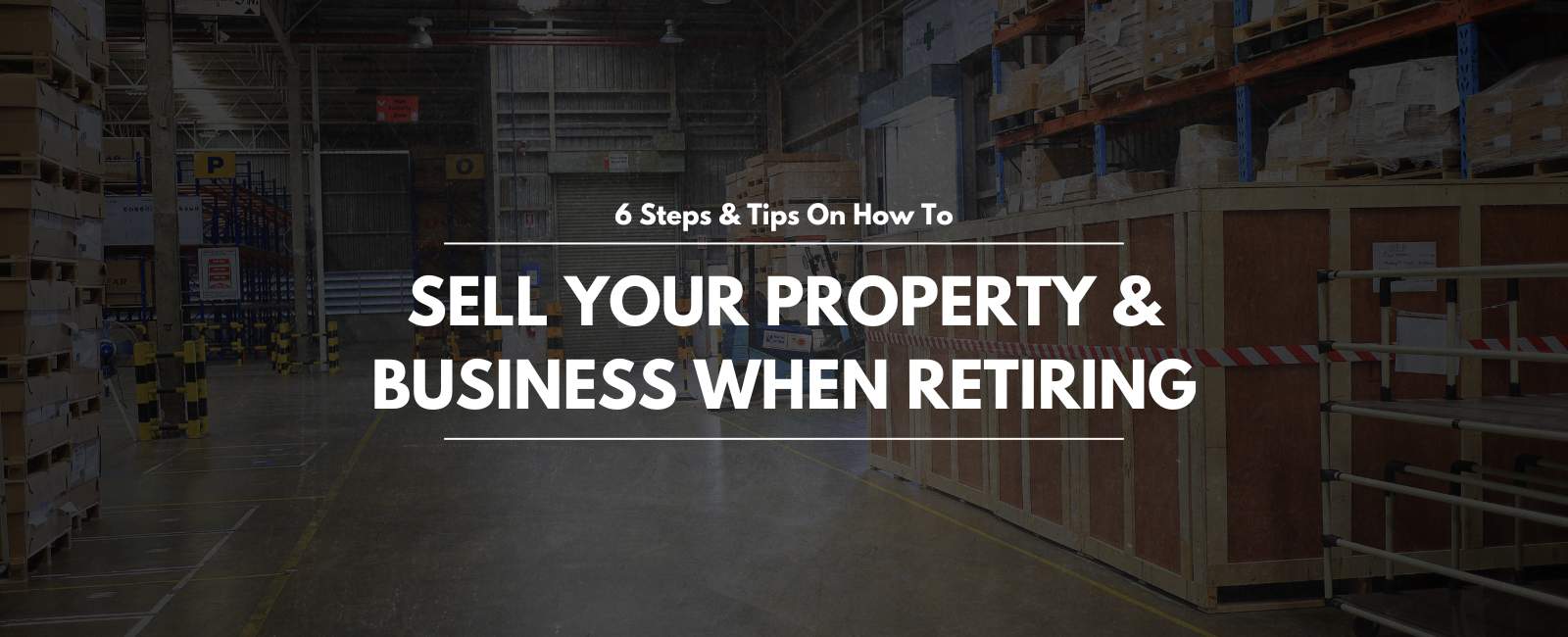It’s estimated that only 30% of small businesses are successfully sold. The remaining 70% are left without a buyer or plan for what happens next.
The close rate on sales is very low. Selling your business for retirement is far from simple and without a solid plan in place, you’ll face an even greater uphill battle.
Here, you’ll learn what you can do with your business and the commercial property you own when you decide to retire as well as the recommended steps you need to take to successfully sell them.
Alternatively, you can hire an experienced broker to valuate your commercial property, help you find potential buyers, and guide you through a smooth transition into retirement.
What to Do with Your Business and Commercial Property When You Retire?
You have several options for handling your business and commercial real estate when you retire, including:
- Selling the business and property together: It might limit your buyer options.
- Selling the business and property separately: This is usually the best way to maximize asset values.
- Selling the business and leasing your commercial property: Ensures recurring income but requires you to manage your property.
- Liquidate the business: Close the business and sell all your business assets (e.g., property, inventory, equipment, etc.).
You can sell or pass your business and commercial property to a family member or current employee(s) rather than a third party.
6 Steps for Selling Your Business for Retirement in California
When it comes to selling your business for retirement, there are several ways you can go about it. It depends on your financial standing, attachment to the business, need for ongoing income, and more.
Besides, not everyone is mentally prepared for retirement — it’s a massive life change.
That’s why, here at MIG Commercial Real Estate Services, Inc., we start by having a frank conversation with any customer:
-
- We talk about what life looks like after retirement and whether you’re ready.
- We brainstorm what the ideal exit strategy looks like for you.
- We offer valuable resources, including connecting you with third-party business brokers who can appraise your business and offer free advice.
- Our professional commercial property brokers can provide you with a free commercial property valuation.
Once you’re more informed, you can make a better decision. For example, it’s not always possible to capitalize on both your business and property — marketing them together might even hurt your bottom line.
That was the case of Ricardo Grasso; he owned a mechanic business that had negligible value.
We advised him to liquidate the business and sell off the equipment and helped him sell the property separately. The property in this case was what was valuable. This way, Ricardo got the greatest return possible on his assets.

Sometimes, the opposite can happen, though. Another one of our clients had a commercial kitchen building with a grease trap and clarifier permit, a food truck parking permit, and water and power hookups.
Marketing them together ended up boosting the total market value of the property because we managed to sell it along with the permits to another Food Truck & Commissary Kitchen Operator.
Our team gives each customer a personalized assessment, tailored to their specific needs and goals.
Step #1: Choose Your Preferred Sale Type
There are several business sale types you can choose from, including:
-
- Stock or share sale
- Merger
- Acquisition
- Management buyout (MBO)
- Employee stock ownership plan (ESOP)
- Family succession
- Asset sale
These last two are the most common. In most cases, asset sale (i.e., selling your business assets individually) is the best option. Besides increasing your pool of buyers, it allows you to minimize your tax burden by allocating the sale price strategically.
The key to succeeding with this sale type is to have the right strategy and people behind you.
For example, we can connect you with liquidation companies that can sell your machines or equipment in bulk, so you don’t have to worry about selling one item at a time.
We can also advise you on how to package and market your assets. For instance, as mentioned above, one of our past clients was looking to sell his business and commercial kitchen building.
We were able to squeeze the most value out of that property’s sale by packaging the licenses and permits he had together with the property, but leaving out the business.
Step #2: Properly Value Your Business — How to Determine What to Sell Your Business For
You need a proper business valuation to get a fair return for your business. Only a certified appraiser can accurately value your business.
The two most common valuation methods are:
- Asset approach: The value of your business is determined by subtracting your business liabilities from the appraised value of its tangible and intangible assets.
- Market approach: The value of your business is determined by comparing it to similar businesses that have been sold in the market.
To get a free market valuation for your commercial property, enter your property address into our valuation page.
We can also connect you with a business broker who can tell you how much your business is worth.
Step #3: Choose the Right Time to Sell Your Business
The timing of your business sale can significantly impact your return. There’s a lot to consider, including economic and market conditions, federal and state taxes, seasonality, and more.
Besides, you’ll have to plan your exit or succession strategy and sale negotiations perfectly to retire around your intended date — several factors can slow down or even halt the process.
Step #4: Create a Business Succession or Exit Strategy
An orderly transition is crucial to minimize disruptions while selling your business for retirement — that’s why you need a business succession or exit strategy.
Plus, several factors can affect the timing of your retirement — planning in advance allows you to stay flexible.
For example, a recession might force you to work longer while a sudden strong market could be an opportunity to sell your commercial property for the highest profit.
Your plan should also address whether you want to sell or lease your property, and include:
- Your commercial real estate valuation
- Sale terms, such as price, conditions, and financing options, or lease terms, such as rental rates and tenant requirements
- The tax implications of selling the property, including capital gains taxes and potential tax deferral strategies
Creating a business exit strategy in advance allows you to maximize profit or limit losses and gives you more control over your retirement date.
Step #5: Prepare the Legal Documents & Accounting for Commercial Property and Business Sale
To sell your business and commercial property in California, you need up-to-date business accounting and several documents. You may need some or all of the following:
- Financial statements for current and past two to three years
- Phase I Environmental Site Assessment (ESA) report
- Seller Disclosure form
- Non-disclosure confidentiality agreement
- Personal financial statement form for buyer to complete
- Offer-to-purchase agreement
- Note of seller financing
- Statement of seller’s discretionary earnings and cash flow
- Accounts payable and accounts receivable aging reports
Figuring out which documents you need and gathering them is difficult and time-consuming. Consulting with legal and tax professionals will save you time and ensure the sale goes through successfully.
Step #6: Negotiate and Finalize the Sale
The final step when selling your business for retirement is to negotiate the price, terms, and conditions.
Once you and the buyer settle on a price and deal structure, generally you’ll have to:
- Review all the paperwork
- Draft and sign a Letter of Intent
- Draft and sign a purchase agreement covering all aspects of the transition
- Finalize the sale by signing all documents, transferring ownership, and receiving the agreed-upon payment
You can hire a broker or negotiator to save you time, maximize the return on your assets, take care of legal aspects, structure the deal properly, and speed up the process.
Our team can valuate your commercial property for free and help you find the perfect buyer.
How to Sell Your Business While Still Operating in the Building
The process of selling your business while still operating in the building is the same as the process we described above.
However, you’ll need to discuss your desire to continue operating during the transition with potential buyers and include certain provisions in your legal contracts.
A CRE Broker Makes the Process of Selling Your Commercial Property for Retirement Simple
After dedicating years or even decades to your business, selling it and transitioning into retirement can be psychologically challenging.
On top of that, you’ll have to deal with complex negotiations, legalities, and all sorts of time-consuming processes. Most people end up making mistakes and losing money.
Our professional commercial real estate brokers can help you choose the best path forward, maximize the return on your business and property, take care of legal paperwork, connect you with industry experts, and more.
Get a free property valuation or contact us today to start the process of selling your business for retirement.
You can reach us via our contact form, email us at [email protected], or call 818.482.3830.
MIG Commercial Real Estate Services Inc. and Alex Matevosian do not provide legal, tax, or investment advice. Any published articles, blog posts, resources, or other related material located on this website are for information purposes only.
Please seek the advice of an attorney, tax professional, and/or financial advisor for legal, tax, or financial advice.

